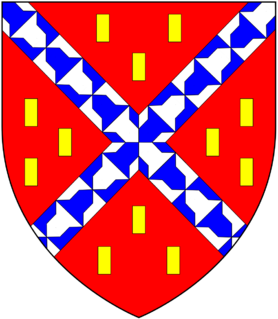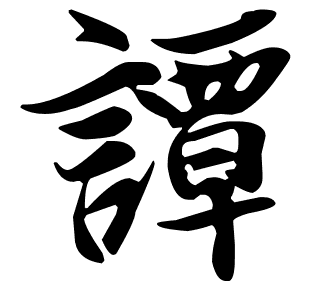Neil is a masculine given name of Irish origin. The name is an Anglicisation of the Irish Niall which is of disputed derivation. The Irish name may be derived from words meaning "cloud", "passionate", or "champion". As a surname, Neil is traced back to Niall of the Nine Hostages who was an Irish king and eponymous ancestor of the Uí Néill and MacNeil kindred. Most authorities cite the meaning of Neil in the context of a surname as meaning champion.

Sir Arthur Champernowne was an English politician, high sheriff and soldier who lived at Dartington Hall in Devon, England.
A birth name is the name of the person given upon their birth. The term may be applied to the surname, the given name or to the entire name. Where births are required to be officially registered, the entire name entered onto a births register or birth certificate may by that fact alone become the person's legal name. The assumption in the Western world is often that the name from birth will persist to adulthood in the normal course of affairs—either throughout life or until marriage. Some possible changes concern middle names, diminutive forms, changes relating to parental status, and changes related to gender transition. Matters are very different in some cultures in which a birth name is for childhood only, rather than for life.
Goff is a surname with several distinct origins, mainly Germanic, Celtic, Jewish, and French. It is the 946th most common family name in the United States. When the surname originates from England it is derived from an occupational name from German, Cornish and Breton. The German Goff means a godly person, a strong warrior, or a priest. The Breton goff means "smith". The English-originating surname is common in East Anglia, where it is of Breton origin. The Welsh name is a variant of the surname Gough, and is derived from a nickname for someone with red hair. The native Irish name is derived from a patronymic form of the Gaelic personal name Eochaidh/Eachaidh, which means "horseman".
MacDonald, Macdonald, and McDonald are surnames of Scottish and Irish origin. In the Scottish Gaelic and Irish languages they are patronymic, referring to an ancestor with given name Donald.
Quinn is an Anglicised form of the Irish Ó Coinn or McQuinn/MacQuinn. The latter surname means "descendant of Conn". The surname Quinn is also rendered Ó Cuinn in Irish. The surname is borne by numerous unrelated Irish families in Ulster and the Irish counties of Clare, Longford, and Mayo. The most notable family of the name are that of Thomond, a Dalcassian sept, who derive their surname from Niall Ó Cuinn who was slain at the Battle of Clontarf in 1014. This family was formerly represented by the Earls of Dunraven. Another family is that seated in Annaly, who were related to the O'Farrell lords of Longford. Other families include one seated in Antrim; one seated in Raphoe; and one called Clann Cuain, seated near Castlebar. In the seventeenth century, the surname Quinn was common in Waterford. In 1890, the surname was numerous in Dublin, Tyrone, Antrim, and Roscommon. Quinn is one of the twenty most common surnames in Ireland. It is sometimes said that the surname Quinn is borne by Catholics whilst Quin is borne by Protestants.
Brian is a male given name of Irish and Breton origin, as well as a surname of Occitan origin. It is common in the English-speaking world. It is possible that the name is derived from an Old Celtic word meaning "high" or "noble". For example, the element bre means "hill"; which could be transferred to mean "eminence" or "exalted one". The name is quite popular in Ireland, on account of Brian Boru, a 10th-century High King of Ireland. The name was also quite popular in East Anglia during the Middle Ages. This is because the name was introduced to England by Bretons following the Norman Conquest. Bretons also settled in Ireland along with the Normans in the 12th century, and 'their' name was mingled with the 'Irish' version. Also, in the north-west of England, the 'Irish' name was introduced by Scandinavian settlers from Ireland. Within the Gaelic speaking areas of Scotland, the name was at first only used by professional families of Irish origin. It was the fourth most popular male name in England and Wales in 1934, but a sharp decline followed over the remainder of the 20th century and by 1994 it had fallen out of the top 100. It retained its popularity in the United States for longer; its most popular period there was from 1968–1979 when it consistently ranked between eighth and tenth. The name has become increasingly popular in South America - particularly Argentina and Uruguay since the early 1990s.
Butt is a German and an English surname whose origins lie in the South West peninsula region of England.
Charlton or Charleton is a surname. Notable people with the surname include:

Tan is a common Chinese surname 譚. It is considered the 56th most common surname.
Scott is a surname of Scottish origin. It is first attributed to Uchtredus filius Scoti who is mentioned in the charter recording in the foundation of Holyrood Abbey and Selkirk in 1120 and the border Riding clans who settled Peeblesshire in the 10th century and the Duke of Buccleuch.

Aylworth is a village in Gloucestershire, England.

Martin may either be a given name or surname. Martin is a common masculine given name and family name in many languages and cultures. It comes from the Latin name Martinus, which is a late derived form of the name of the Roman god Mars, the protective godhead of the Latins, and therefore the god of war. The meaning is usually rendered in reference to the god as "of Mars", or "of war/warlike" ("martial").
Smithers is a surname of English origin. It derives from the Middle English term "smyther", referring to a metalsmith, and is thus related to the common occupational surname Smith. The name Smither is related.
Anthony is an English surname. It derived from the Antonius root name. The early origin of the name traces back to Lincolnshire. Notable people with the surname include:
Cary is a surname. Notable people with the surname include:
Conway is a Welsh, Irish & Scottish surname. The name has several origins.
Ling is a surname which can be of either Chinese, English, or Nordic origin.
John Aylworth, of Wells, Somerset, Dartington, Devon and Bangor Place, Holborn, London, was an English politician.
Kali is an Indian feminine given name of Sanskrit origins from the name Kālá.



